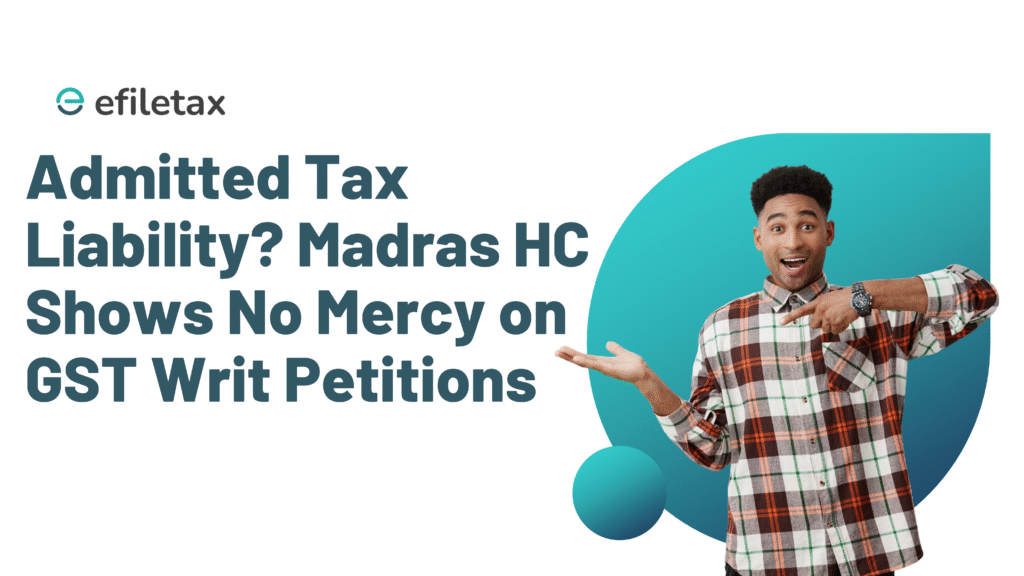
Madras HC on GST liability admission
A recent Madras High Court order has reaffirmed a vital principle: once a GST taxpayer admits their tax liability in a written reply, they cannot later challenge the same through a writ petition.
This blog explains the ruling, its legal basis, and practical steps taxpayers should take to avoid similar issues.
Background of the case
- A taxpayer filed a writ petition against a GST demand order.
- However, in their earlier reply to a show-cause notice, they clearly accepted part of the liability.
- The Madras High Court held that such an admission is binding and dismissed the petition without going into merits.
Key legal points
✅ Admission is evidence:
Under Section 58 of the Indian Evidence Act, 1872, facts admitted need not be proved.
✅ No writ when effective alternative remedy exists:
Courts consistently reject writs if there’s a clear admission or an available appeal under Section 107 of the CGST Act, 2017.
✅ Relevant case:
Ramco Cements Ltd vs. Assistant Commissioner (ST) — Madras HC, June 2025.
Practical takeaways for GST payers
Before replying to a notice:
- Consult your tax advisor.
- Avoid hasty admissions in writing.
- If liability is disputed, state your reasons clearly.
If you have admitted liability:
- Pay the admitted amount to avoid interest and penalties.
- File an appeal for the disputed part instead of filing a writ.
If you receive an adverse order:
- Use the appeal process under Section 107 (First Appeal) or approach the GST Appellate Tribunal (Section 109) once operational.
Expert tip: Be mindful when replying
“Admissions in tax replies bind you later. Always draft replies carefully — even a single line can decide your legal options.”
— Efiletax GST Expert
Comparison: Writ Petition vs. Appeal
| Feature | Writ Petition | Statutory Appeal |
|---|---|---|
| Purpose | Challenge violation of fundamental rights | Challenge factual or legal errors |
| When allowed | Rarely for tax disputes | Standard route for tax matters |
| Time limit | No specific timeline but must be prompt | Usually 3 months (Section 107) |
| Outcome | Discretionary relief | Merits-based decision |
FAQs on GST liability admission
Q1: Can I withdraw my admission later?
Generally, no. Courts treat admissions seriously under evidence law.
Q2: Can I file a writ if I feel harassed?
If you have an effective statutory remedy, the court may dismiss it.
Q3: How can Efiletax help?
Efiletax helps draft replies, handle appeals, and resolve GST disputes end-to-end.
Key takeaway
A careless admission in a GST reply can close the door for writ relief. Always consult experts before replying to notices to protect your rights.
Stay compliant with Efiletax
Avoid costly mistakes. Connect with Efiletax for GST notices, appeals, and professional representation.
Summary
The Madras HC ruled that a taxpayer’s writ petition challenging a GST demand was not maintainable because they had already admitted liability in their reply. Taxpayers should avoid casual admissions and use proper appeal channels instead.